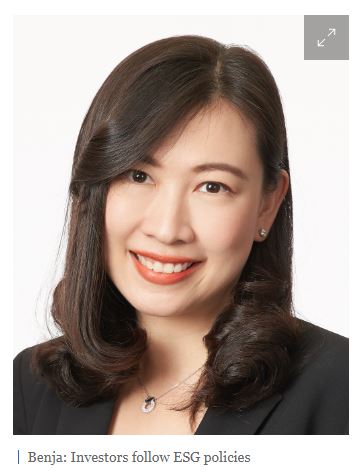Sustainability retains resonance for Thai firms
Sustainability will remain a key trend for fundraising in Thailand, prompting companies to increasingly integrate environmental, social and corporate governance (ESG) considerations into their strategies, says international law firm Baker McKenzie.
“Investors these days take into account the ESG policies that companies adopt,” Benja Supannakul, a partner in Baker McKenzie’s financial services practice group, told the company’s recent conference in Bangkok.
As a result, she advised listed companies to start thinking about how they could improve their operational systems to attract investors and achieve sustainable growth.
“Sooner or later, companies will have to come up with a stance and branding on ESG, as future government policies will encourage and reward these practices, while penalising firms forgoing ESG through taxation,” said Ms Benja.
The law firm said a major ESG trend involves transforming operational systems, such as switching from fossil fuels to biomass to help reduce greenhouse gas emissions.
If companies are unable to abruptly change their operations, they can buy carbon credits from the market instead, she said.
“Several projects currently focus on carbon credits, helping companies to achieve net-zero objectives through purchasing points that are used to deduct from their carbon dioxide emissions,” said Ms Benja.
Thailand’s net-zero initiative is still voluntary.
The two most popular carbon credit options in Thailand are over-the-counter and the FTIX platform recently launched by the Federation of Thai Industries.
Thailand is projected to have an exchange market where carbon credits are traded like stocks, facilitating companies that want to reduce their emissions, she said. More initiatives to push the ESG agenda will be introduced by the Stock Exchange of Thailand (SET), said Ms Benja.
The SET launched a data platform that compiles information on listed companies’ ESG performance. The platform allows firms to disclose their engagement with ESG, offering insight for users.
“Going forward, the SET will start conducting a score-based evaluation of companies’ ESG activities. This will help investors make decisions based on ESG ratings, setting a clear benchmark reference assessed by third parties,” she said.
According to the SET’s Sustainable Capital Market Development Plan, in 2022 there were 170 public companies whose shares were on the Thailand Sustainability Investment (THSI) Index. The figure was an uptick from 144 companies a year earlier.
The top three industries on the THSI Index were the service sector (33 companies), resources (28), and real estate and construction (27). Companies on the THSI have a total market capitalisation of 14 trillion baht, representing 72% of the total capitalisation of both the SET and the Market for Alternative Investment as of October last year.
Source: https://www.bangkokpost.com/business/2514091/sustainability-retains-resonance-for-thai-firms


 English
English




